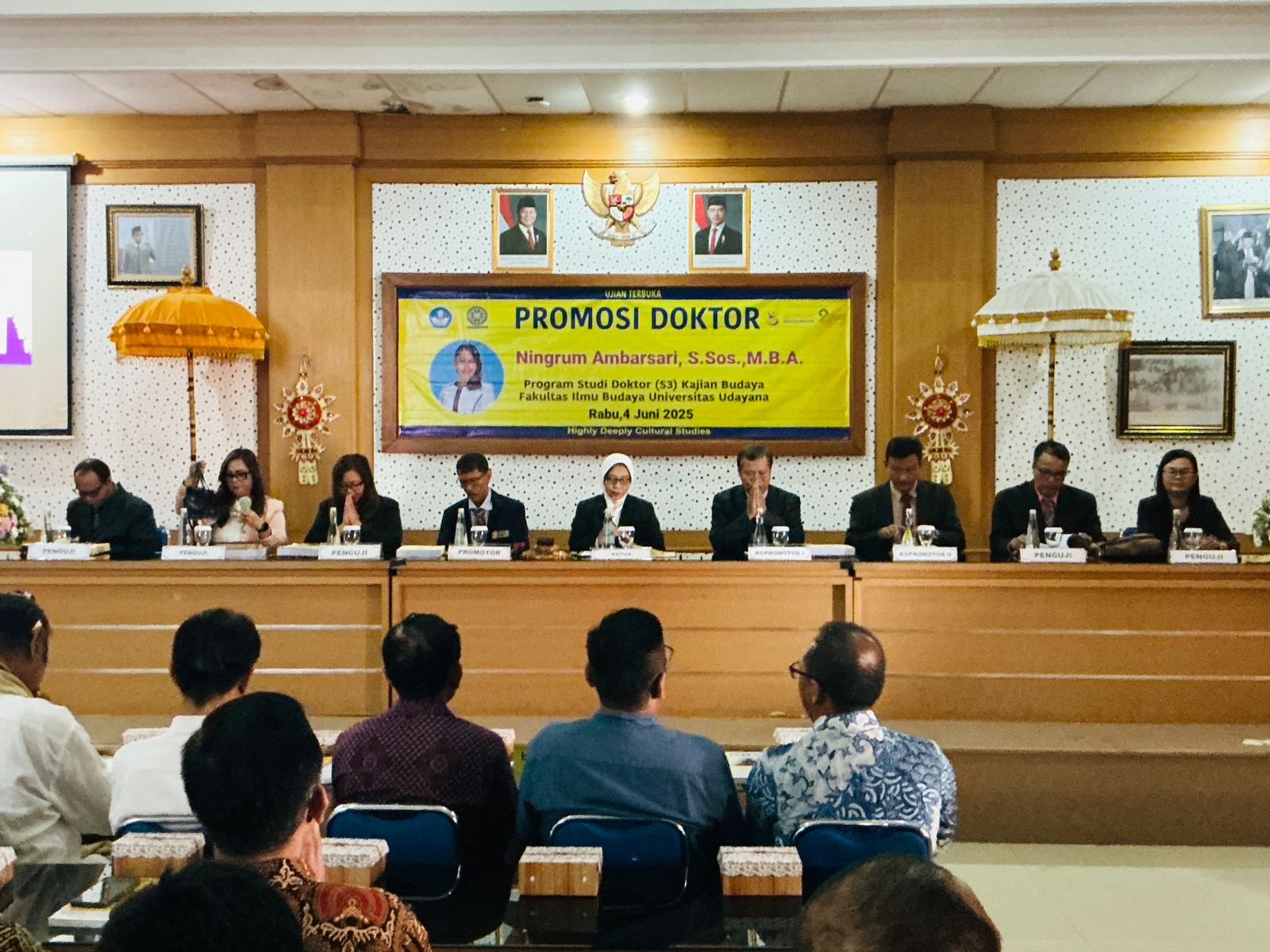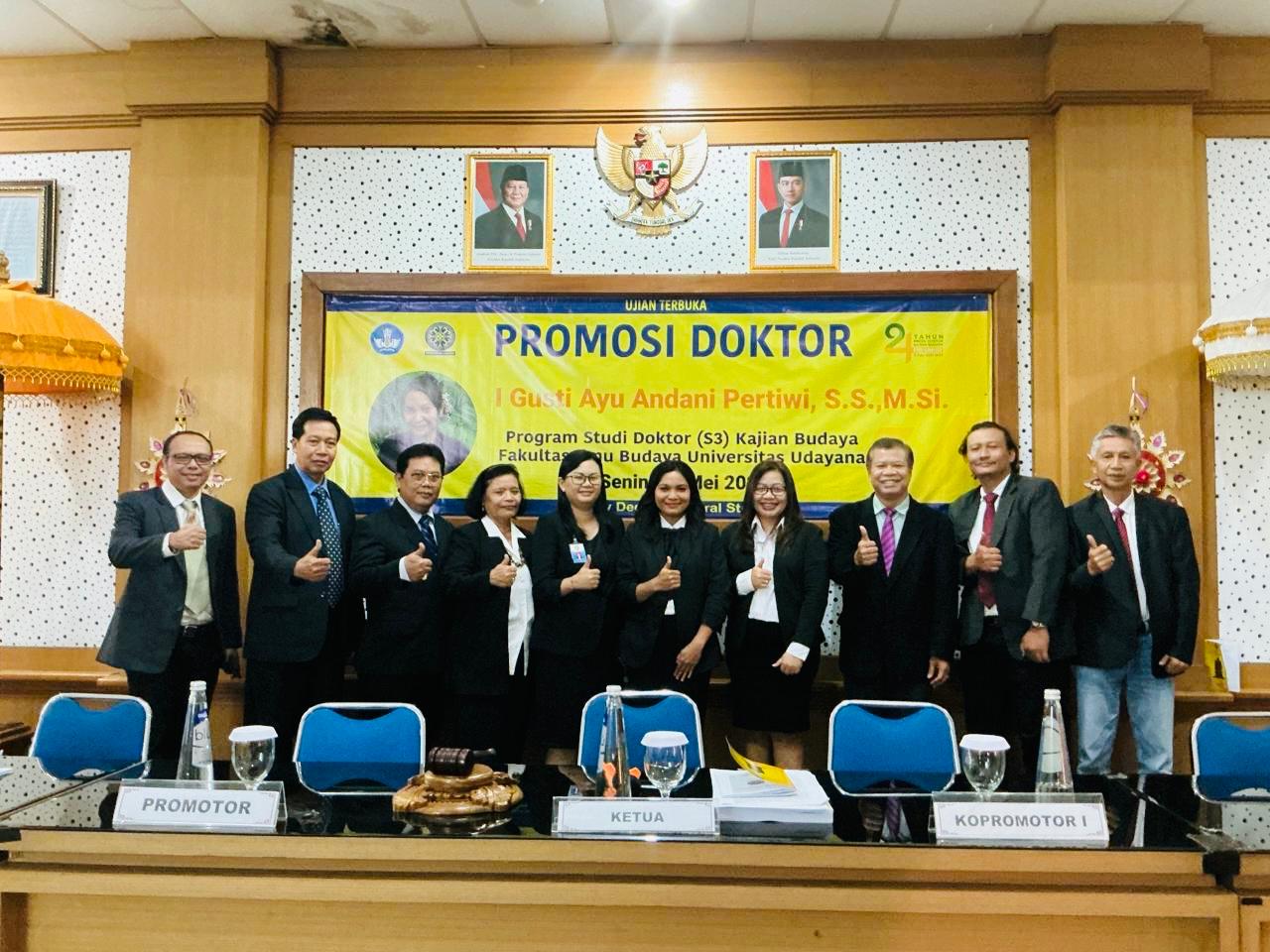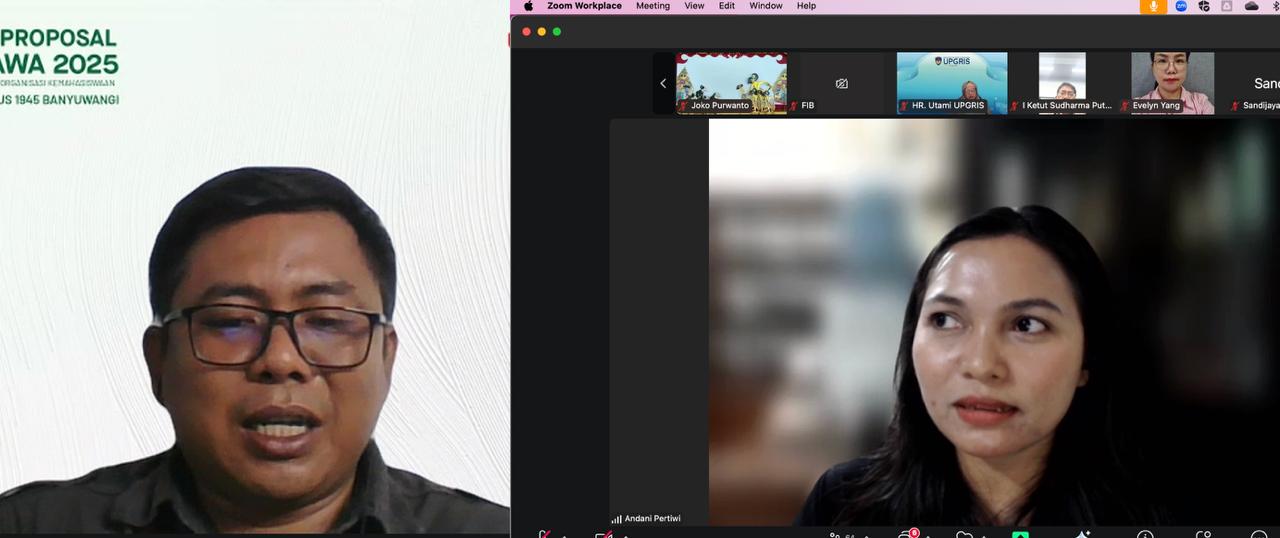Exploring the Transformation of Yoga in Global Capitalism in Bali, Ningrum Ambarsari Earns a Doctorate in Cultural Studies from Udayana University
A lecturer from Universitas Prof. Dr. Moestopo (Beragama), Indonesia, has earned a doctoral degree in Cultural Studies after successfully defending her dissertation in a public doctoral examination at the Doctoral Program in Cultural Studies, Faculty of Humanities, Udayana University, on Wednesday, June 4, 2025.
Ningrum Ambarsari, S.Sos., M.B.A., defended her dissertation entitled “Spirituality and Commodification: Transformation of Yoga in the Global Capitalism in Bali”, which was written entirely in English. Ningrum was declared to have passed with the distinction of...
Dr. Ningrum Ambarsari is the 292nd doctoral graduate of the Cultural Studies Doctoral Program at Udayana University, or the 248th doctoral graduate from the Faculty of Humanities.
The public examination was chaired by Prof. Dr. Ni Luh Nyoman Seri Malini, S.S., M.Hum., with the examination panel consisting of Prof. Dr. A.A. Ngurah Anom Kumbara, M.A. (Promoter), Prof. Dr. I Nyoman Darma Putra, M.Litt. (Co-promoter 1), Dr. Nanang Sutrisno, S.Ag., M.Si. (Co-promoter 2), Prof. Dr. Ni Luh Nyoman Seri Malini, S.S., M.Hum., Dr. Ida Ayu Laksmita Sari, S.Hum., M.Hum., Prof. Dr. I Gede Sutarya, SST., M.Ag. (UHN Sugriwa), Dr. Mayske Rinny Liando, S.Pd., M.Pd. (Manado State University), Dr. Ni Luh Ramaswati Purnawan, S.S., M.Comn., and Dr. I Wayan Mustika, M.Hum. (Lecturer from University of Lampung).
The examination, held in the Dr. Ir. Soekarno Room, 4th Floor, Poerbatjaraka Building, Faculty of Humanities, Udayana University, Jalan P. Nias 13, Denpasar, was attended by faculty members, students, the general public, and the family of the promovenda, Ningrum Ambarsari.
The Commodification of Yoga
In her presentation, Ningrum Ambarsari focused her research on three interconnected aspects:
the forms of yoga transformation from spirituality to contemporary practice in three major tourism areas—Ubud, Seminyak, and Denpasar,
the ideologies underpinning the transformation of yoga practices,
the consequences of these transformations.
This study was conducted using a qualitative approach with critical analysis, employing theories of power relations, social practice, and post-religious spirituality.
According to Ningrum Ambarsari, there are four types of transformation in yoga practices in Bali:
ideological transformation,
transformation of processes or yoga practices,
transformation of management,
transformation of symbols.
In practice, these transformations are driven by four dominant ideologies: health culture, capitalism and commodification, globalization and Westernization, and spirituality as self-revitalization.
“Under the influence of global capitalism, yoga practice increasingly becomes a commodity, turning a spiritual activity into a marketable product,” said Ningrum, a yoga practitioner and author of the book Yoga itu Penting (Yoga Matters, 2020).
Ningrum Ambarsari added that the popularity of yoga has implications such as effects on the local economy, cultural adaptation, hybrid practices, and an expanded function of yoga. These include creating job opportunities for local residents and increasing income through services, accommodations, and merchandise. Additionally, yoga’s transformation demonstrates its evolving role in diplomacy, cultural identity, and local wisdom, which promotes sustainable development, fosters international cooperation, and helps preserve cultural heritage.
According to Ningrum, her study presents a new finding: that modernity does not lead to the desacralization of yoga practice. Instead, modernity retains sacred elements, even while adapting to global demands.
“The main goal of yoga remains unchanged; what changes are the infrastructure and structures that support its practice,” she added.
This research opens avenues for further studies in popular culture, by identifying dominant institutions or agents in the transformation process, expanding research locations, and analyzing empirical data on the economic implications for Balinese society.
Her research has been published in an article titled “Transformation of Yoga in Bali in the Era of Global Tourism”, in Jurnal Kajian Bali, Vol. 15, No. 1, April 2025 (https://ojs.unud.ac.id/index.php/kajianbali/article/view/122810)
The doctoral promotion examination concluded with the awarding of a graduation certificate and a speech by the promoter about the significance of the dissertation. Prof. Dr. A.A. Ngurah Anom Kumbara, M.A., as promoter, delivered the closing remarks.



FACULTY OF HUMANITIES UDAYANA UNIVERSITY